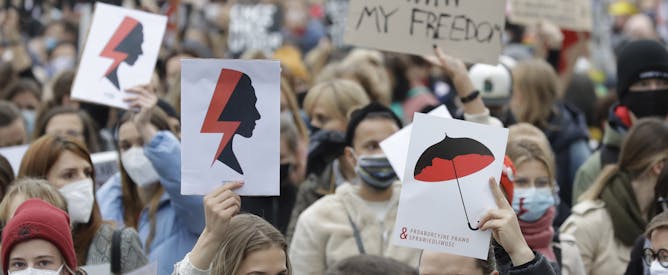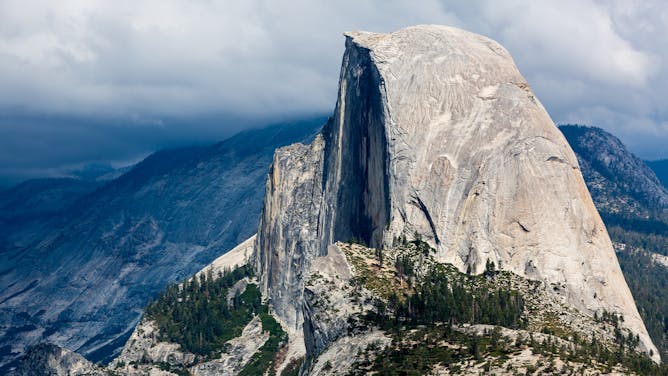|
|
|
|
SpaceX’s plan to deliver widespread high-speed internet using satellites is upsetting stargazers everywhere. With 895 satellites already launched, and plans to launch another 12,000, the sky will be filled with mega-constellations of Starlink satellites whizzing through orbit.
Already, amateur and professional astronomers alike are upset by the satellites photobombing captured images and time-lapse photography of galaxies and constellations. But this is just the beginning.
Today in The Conversation Canada, Samantha Lawler from the University of Regina writes that soon, the sky could turn into a “mundane highway of moving lights, obscuring the stars,” ruining stargazing forever.
And that’s not even the half of it: SpaceX is also seeking permission to launch an additional 30,000, and other companies including Amazon are getting into the satellite game. And there’s the accompanying issue of space junk that needs to be addressed.
Also today:
|
Nehal El-Hadi
Science + Technology Editor
|

|
|

A shooting star during the Perseid meteor shower. Soon, thousands of satellites will crowd the night sky.
(Shutterstock)
Samantha Lawler, University of Regina
SpaceX's satellites will populate the night sky, affecting how we observe the stars. And this is just the beginning of private satellite mega-constellations.
|

Adults need to pay attention to children’s voices and imagine a different future — not for children but with them.
(Shutterstock)
Julie C. Garlen, Carleton University
World Children's Day is an opportunity to acknowledge children for who they are, the many things they know and what they are capable of right now.
|

Antibiotics do not shorten or reduce the severity of colds or flu, but they could produce adverse effects that make you feel even worse.
(Pexels/Andrea Piacquadio)
James Dickinson, University of Calgary; Ranjani Somayaji, University of Calgary; Samiha Tarek Ah Mohsen, University of Calgary
Resistant bacteria aren't the only risk posed by overprescribing antibiotics. A more immediate risk is side-effects and reactions, which a new review shows are surprisingly frequent and often severe.
|

Women’s rights activists with posters of the Women’s Strike symbol protest in Warsaw, Poland, in October 2020 against a further tightening of Poland’s already restrictive abortion laws.
(AP Photo/Czarek Sokolowski)
Kate Korycki, Western University
The women’s movement in Poland faces a powerful and as yet unchallenged adversary in the Catholic Church.The protesters have correctly shone a spotlight on the church for its hold on Polish politics.
|

In this Oct. 3, 2017, iconic photo, President Donald Trump tosses paper towels into a crowd in Guaynabo, Puerto Rico, after Hurricane Maria devastated the region. The recent U.S. election brings with it hope for more caring practices from elected officials.
(AP Photo/Evan Vucci)
J.M. Opal, McGill University
The United States was built on the idea of public safety and well-being. Those values have been slowly eroded since the '80s. Can the U.S. find its way back to a more caring civil society?
|
La Conversation Canada
|

Le Half Dome en Californie est composé de granit, une roche avec une densité relativement faible.
Shutterstock
Joshua Davies, Université du Québec à Montréal (UQAM); Jesse Reimink, Penn State
La formation des premiers continents a fait l’objet de débats. L’analyse des zircons au Canada et en Australie suggère que ces processus historiques sont similaires aux mouvements tectoniques actuels.
|

Des manifestations ont été organisées dans toute la France pour soutenir la liberté d'expression et pour rendre hommage à Samuel Paty, un professeur d'histoire qui a été décapité le 16 octobre 2020, près de Paris, après avoir discuté avec sa classe des caricatures du prophète Mahomet.
AP Photo/Michel Euler
Sivane Hirsch, Université du Québec à Trois-Rivières (UQTR)
Le désir de secouer les élèves peu engagés amène parfois les enseignants à montrer des images choquantes, renforçant la sensibilité du thème. D’autres préfèrent simplement éviter cet enseignement.
|
Health
|
-
Hilary A. Marusak, Wayne State University
The jury's still out on whether or not CBD relieves stress and anxiety.
|
|
Business + Economy
|
-
Seppe Deckers, KU Leuven; Jan Nyssen, Ghent University; Sil Lanckriet, Ghent University
Food security in Tigray was becoming critical even before the current armed conflict.
|
|
Environment + Energy
|
-
Ian Williams, University of Southampton; Alice Brock, University of Southampton
Here's how to quench your thirst in an environmentally responsible way.
|
|
| |
| |
| |
| |
| |
| |
|
|
|
|
|
|
|